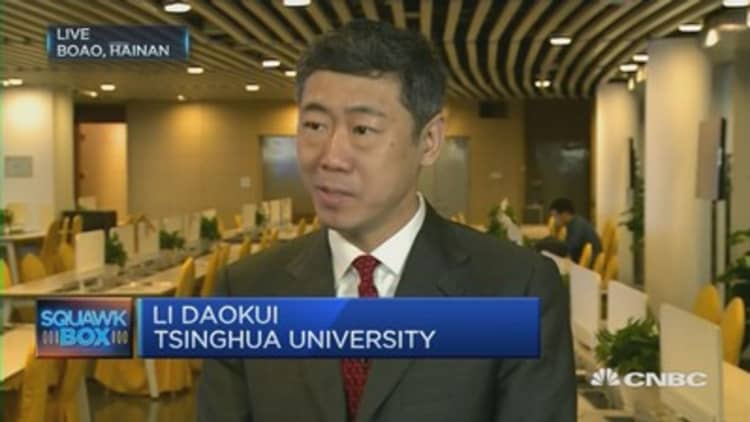
Many assumptions about China held by global market players, such as thinking Beijing wants a weaker yuan or that low oil prices are caused by the mainland's slowing growth, are simply wrong, according to a leading Chinese policy adviser.
Li Daokui, director of the Center for China at Tsinghua University and former member of the People's Bank of China (PBOC) monetary policy committee, said prominent hedge fund managers, including the likes of Kyle Bass, have misunderstood the world's second-largest economy.
For one, focusing on the currency is "the biggest mistake in reading the Chinese economy," said Li on the sidelines of Thursday's Boao Forum for Asia conference.
"There is no need for the Chinese economy to rely on a big boost of exports....the economy is still facing a big trade surplus."
Ever since Beijing surprised the world by unexpectedly depreciating the renminbi in August, money managers such as Kyle Bass, David Tepper and Bill Ackman have ramped up bearish bets against the yuan. Goldman Sachs predicts the dollar will be fetching 7 yuan by the end of the year, from 6.5 currently, amid expectations for looser monetary policy and the government's desire to boost sagging exports.
But exports are no longer as important as before the global financial crisis, Li explained, adding that the sector now makes up 20 percent of gross domestic product (GDP), compared with 35 percent previously.
"The renminbi is already an international currency in the region, so when it devalues, everybody devalues. The net impact is almost zero," he added.
Indeed, fears for an Asian currency war hit fever-pitch after August's historic devaluation. Export-oriented economies, such as neighboring South Korea, are typically flagged as the most vulnerable to a weaker renminbi as their goods appear more expensive overseas, sparking worries that other central banks would weaken their own currencies to maintain trade competitiveness.
"When the Chinese economy does devaluation, the momentum of financial markets will kick in to expect more devaluation. The game has no good ending for anyone," Li said.
Li's views echo those of Premier Li Keqiang, who said on Thursday that depreciation would not help companies be more competitive, repeating that the government would not devalue the yuan to lift exports. PBOC adviser Huang Yiping also told CNBC on Wednesday that he didn't believe a weaker currency could positively impact growth.
China also unfairly receives much of the blame when it comes to the recent commodity price crash, Li noted.
With GDP growth sliding to a 25-year low in 2015, China's appetite for energy has waned, leading many analysts to blame the mainland for oil's recent declines.
"In the case of oil, it's a supply story. The U.S. used to be big buyers, but now it isn't because of its own supply of gas. If you want to predict the oil price, look at Saudi Arabia. Try to predict whether Saudi Arabia will be stable, or whether Iran will pump out more production, but don't look at China for clues," Li said.
Ballooning corporate debt is another major trend that global analysts focus on when assessing China. Corporate debt stands at around 160 percent of GDP, double the size of the U.S., according to a Thomson Reuters study last year.
But investors shouldn't fret about this because Beijing has experience in reforming inflated state-owned enterprises (SOEs), which hold the majority of the debt, Li said.
"Sixteen years ago, China did a huge restructuring of all sectors, including SOEs. Today, the economic restructuring conditions are much better, the issue is just commitment," he said.
He believes the current restructuring program isn't intense enough and says he has pushed the government to speed up measures.
Overall, he's optimistic that Beijing can achieve its 6.5-7 percent GDP growth target this year.
A gradual recovery in the property market is underway, especially in large cities, so housing investment will see 5 percent growth, versus zero percent last year, he noted. The loosening of China's one-child policy, announced last year, is another growth booster, he added.
"Second babies are coming to help. They will bump up GDP by 0.2 percent by the end of this year."



